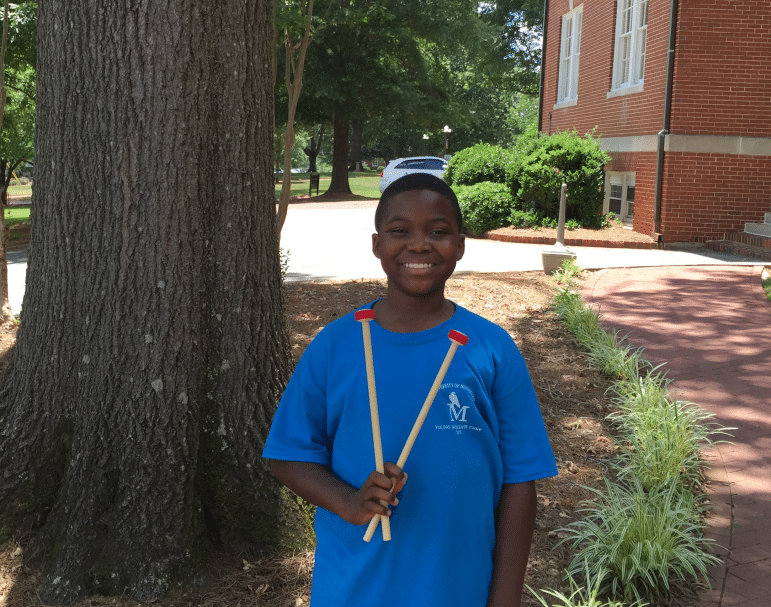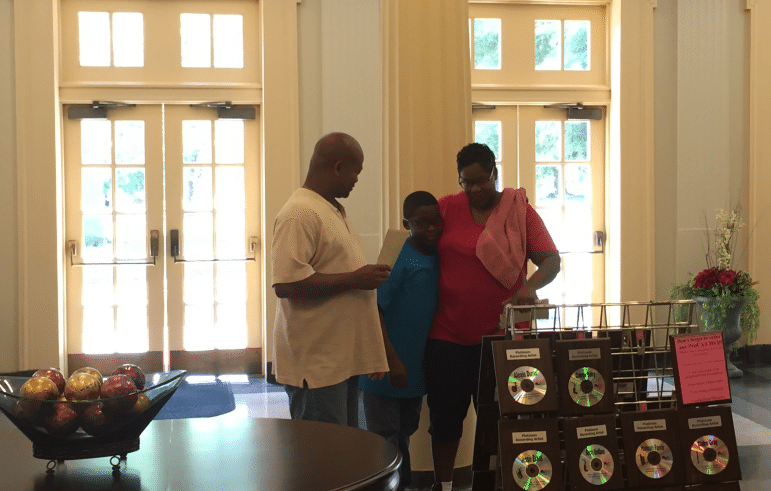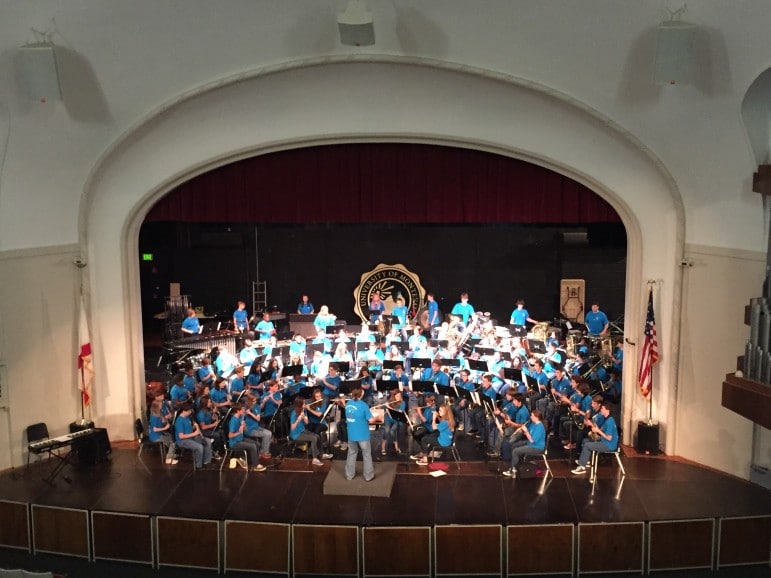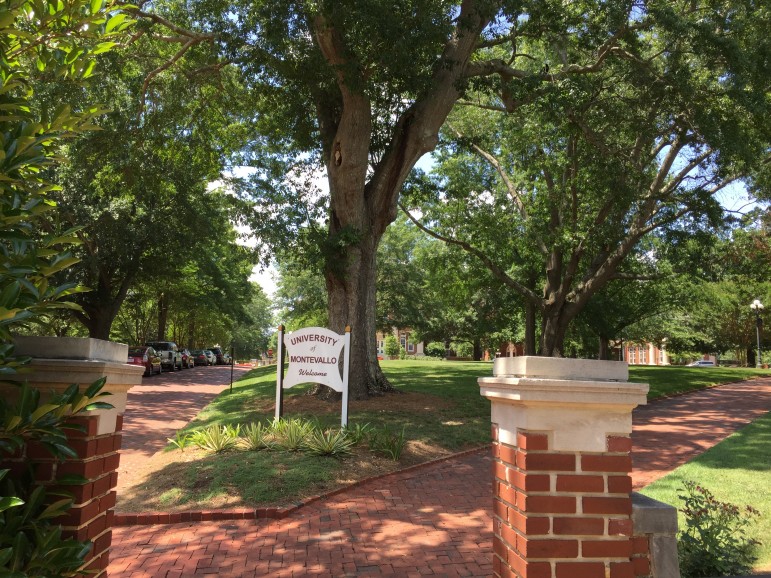Pushing Middle-Schoolers All The Way Through College
Fewer reading materials in the home. Less access to camps or museums. Those are some reasons summer learning loss disproportionately affects low-income kids. And there are many in the South, which can hamper efforts to raise graduation rates. But in the second part of this Southern Education Desk series, WBHM’s Dan Carsen reports on “GEAR UP Alabama” — a wide-ranging federally funded attempt to meet those challenges, and more. Listen above or read below.
A surprisingly good student band is doing its thing on the last day of a weeklong music camp at Alabama’s picturesque University of Montevallo. The camp attracts talented kids from around the Southeast, mostly from families who can afford the tuition. But through a grant program just getting started, students who otherwise couldn’t are joining in.
Middle-school drummer Ashton Bridges was nervous about staying more than a hundred miles from his Phenix City home for the first time. But it’s all good now.
“It’s been cool,” he says. “We’ve been learning new music and playing new instruments, like timpani, and mallet xylophone, marimba. Some of it I’d never seen before.”
Being around different kinds of people was also new for Ashton.
“It’s scary at first, but you get used to it. They were funny and fun and they were nice, and I made new friends.”
Ashton’s mom Barbara Bridges is thankful he had the opportunity. “Without the GEAR UP program, it probably wouldn’t have been possible,” she says.
Ashton and four other students from Alabama’s low-income Black Belt region got camp scholarships through GEAR UP Alabama, one of ten of these statewide grants announced by the U.S. Department of Education last fall.
Program Director James Davis says the approach is unique because “it begins with the seventh-grade cohort, and it follows them through the educational pipeline,” meaning through high school and potentially beyond. The six- or seven-year, locally matched grants are meant to help low-income kids get to and through college or trade school. That means boosting ability and aspiration. So besides tutoring, scholarships, financial aid workshops, and other GEAR UP staples, another tactic is to expose kids from isolated areas to new institutions and to new people. Barbara Bridges says that part was hard for Ashton, partly because he was homesick, at least at first.
“It was an experience,” she says. “And his roommate had been here before, and he was very encouraging. That helped us, a lot.”
There’s a separate GEAR UP program in Birmingham City Schools, but the $3.5-million-a-year statewide grant is meant to help more than 9,000 kids from the poorest and most isolated counties across Alabama, which are some of the poorest and most isolated counties in the United States. But staffers are trying to punch through that.
“There’s life, outside of, you know, our stop sign,” says Samantha Elliot-Briggs, one of six GEAR UP Alabama regional coordinators. “So many children who are just 30 miles down the road may not have resources or transportation to come to the University of Alabama and see its campus.”
But, she says, you can plant seeds. “To be able to travel from their small towns to a university campus and to have that experience and that exposure, spend the night away from home.”
GEAR UP stands for Gaining Early Awareness and Readiness for Undergraduate Programs. So anything that puts college on the radar, gets kids into challenging courses, or supports them through and beyond high school is fair game. Social skills are key, too, and not just for the workplace. GEAR UP Alabama director Veronique Zimmerman-Brown used to teach at the University of Alabama at Birmingham, which is overseeing the grant. She says, “They’re not getting along in college either! They’re having to break up disagreements in the dorms. I mean, little cat fights in the cafeteria. And you’re in college.”
And she’s not blaming students or their families. She adds, “rather than complaining about it — ‘Oh it should come from the home!’ — well, you’re making some assumptions about [working families] now. Number one, that there are two parents or that there’s a parent there at all. We have to start addressing some things as a community, as a society, and stop passing the buck, passing the blame.”
GEAR UP Alabama’s 21 school districts and 13 community partners are shooting for ambitious, big-picture changes. It’s too early to tell whether it’ll help more poor kids get beyond high school. But in places it’s been around long enough to yield data (see section staring on page 119), there are signs the approach works. Though the numbers are complex (see also here), GEAR UP’s been linked to increased graduation rates, knowledge of college, and higher education enrollment.
There’s still a tremendous amount of work to be done, but a diverse network of organizations and educators are pushing ahead. And people directly affected are hopeful. That includes Ashton’s Bridges’ father, Eddie Bridges.
“Well, in the long term, it should better him as a person,” he says. “He gets a chance to meet all different people … from all different walks of life.”
Q&A: How harm reduction can help mitigate the opioid crisis
Maia Szalavitz discusses harm reduction's effectiveness against drug addiction, how punitive policies can hurt people who need pain medication and more.
The Gulf States Newsroom is hiring a Community Engagement Producer
The Gulf States Newsroom is seeking a curious, creative and collaborative professional to work with our regional team to build up engaged journalism efforts.
Gambling bills face uncertain future in the Alabama legislature
This year looked to be different for lottery and gambling legislation, which has fallen short for years in the Alabama legislature. But this week, with only a handful of meeting days left, competing House and Senate proposals were sent to a conference committee to work out differences.
Alabama’s racial, ethnic health disparities are ‘more severe’ than other states, report says
Data from the Commonwealth Fund show that the quality of care people receive and their health outcomes worsened because of the COVID-19 pandemic.
What’s your favorite thing about Alabama?
That's the question we put to those at our recent News and Brews community pop-ups at Hop City and Saturn in Birmingham.
Q&A: A former New Orleans police chief says it’s time the U.S. changes its marijuana policy
Ronal Serpas is one of 32 law enforcement leaders who signed a letter sent to President Biden in support of moving marijuana to a Schedule III drug.











